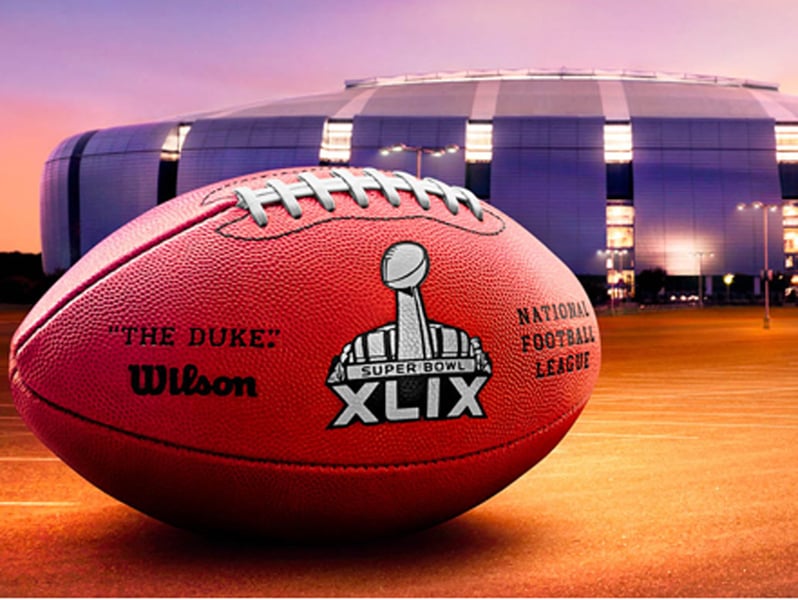Whether you're going to watch this Sunday's Super Bowl for the game or clever ads — or even if you're only interested in seeing if the footballs are properly inflated — you will be among the 110 million worldwide viewers tuning in.
For the advertisers shelling out
$4.5 million per 30-second spot, the captive audience is considered worth the investment.
But, for investors looking for an edge, there's plenty of debate over whether such high-profile advertising does anything measurable for a company's stock price.
Consider, for example, Anheuser-Busch Inbev SA ADR (BUD), which spends millions during the game to mostly promote its flagship Budweiser brand, even though
sales of the American lager have been in steady decline for more than a decade.
Meanwhile, Anheuser-Busch's stock price has gained more than 20% over the past 12 months, and is up 6.8% so far this year.
The S&P 500 Index, by comparison, gained 14.5% over the past 12 months, and has declined by 26 basis points since the start of the year.
This might help at least partially explain
Presidium Capital chief investment officer Greg Hamon's recent fondness for Anheuser-Bush and other Super Bowl advertisers leading up to and just beyond the big game.
Whether it is coincidence, or actually linked to Super Bowl ads, there are similar performance stories for other top advertisers.
PepsiCo Inc. (PEP), which is expected to continue its pattern of hilarious Doritos ads during the game and is also sponsoring the halftime show, has seen its stock price gain 22.6% over the past 12 months, and 4.2% since the start of the year.
There's a similar performance story for advertiser Microsoft Inc. (MSFT), which has seen its stock price gain 34% over the past 12 months, and is up 1.6% this year.
From an as-yet undisclosed ad by Avocados From Mexico to web-developer Wix.com buying its first Super Bowl ad,
the complete list of advertisers includes a mixed bag of messages and agendas, and they probably don't all represent investment opportunities.
But the question is, can an investment strategy be derived from this annual advertising bonanza?
“There's a reason people pay a premium for those ads, because a lot of people see them, and the ads generally test out better than normal ads,” said Bob Rice, managing director at Tangent Capital.
“Buying an ad in the Super Bowl doesn't mean your stock will do well, but there could be a correlation between those companies that take out ads and successful companies, because the ads cost a lot of money,” he added. “Anything more than that is to confuse correlation with causation.”
As Mr. Rice explained, the Super Bowl “is really the Oscars season for advertising.”
“Everyone tunes in for the ads, as well as the football, but some people tune in just because of the ads,” he said. “They do get a higher level of attention and have a longer lasting impact on people's perception of the brand, but I would not go out and buy stocks merely because they were Super Bowl advertisers.”
A little more than a decade ago, when Super Bowl ads had become a legitimate — and sometimes the sole — reason to watch the game, many of the bigger advertisers did see measurable stock-price bumps for a few days following the game.
But much of that Super Bowl-effect has since been diluted by the fact that the most popular and highest-profile ads are now predictably being produced by the same advertisers, and the stock market has essentially factored that in, according to Kenneth Kim, chief financial strategist at Eqis Capital, and co-author of the 2008 paper “A test of the representative bias effect on stock prices: A study of Super Bowl commercial likeability.”
“I think what happened is, the effect has simply warn off, because everyone expects Budweiser and Doritos to have the funniest commercials,” he said.
Mr. Kim described the earlier evidence of stock-price bumps following the Super Bowl as a “stereo-type bias.”
“Just like a clean car doesn't necessarily represent a good-running car, a good firm representation through an ad doesn't necessarily represent a good stock pick,” he said. “At one time, our liking a stock because we liked the commercials caused a brief stock-price bump, but that has faded away because it has been the same commercials that everyone likes over the past 10 years, and that
doesn't generate much of a stock-price bump anymore.”
Even if such market reactions did still exist, it would take a swift hand to capitalize on them, according to Paul Schatz, president of Heritage Capital LLC.
“Except for anything more than a quick trade, there is no solid historical correlation between Super Bowl ads and stock price performance,” he said. “I can see how the advertising could certainly raise awareness, and in a really short term juice a company, but everything reverts back to long- and intermediate-term price trends.”







